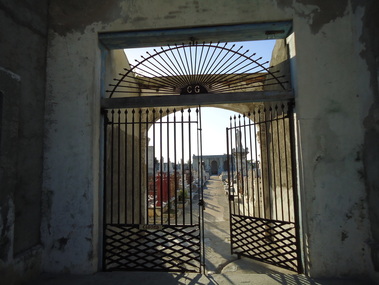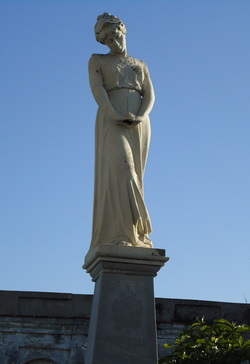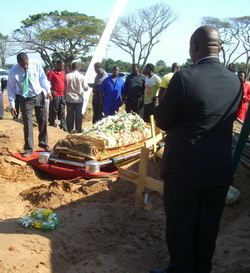 Cemetery doors mark the boundary between the living and the dead.
Cemetery doors mark the boundary between the living and the dead. This week, two things happened that made me think about writing this blog on the death of a santero/a. A well known and well loved member of our religious community died very suddenly of a heart attack, and immediately his godfather, godsisters and godbrothers went into action, planning for his Itutu ceremony. In addition to the visitation for family and friends in a funeral home, the memorial service in his home, the burial that will take place next week, there is a religious ceremony that needs to take place to determine what to do with his Orichas now that his body has left the earth and he is no longer here to look after them. How we conduct the Itutu ceremony is not public knowledge, meaning the details should only be known by initiated priests and priestesses in the religion. It's not open to the general public, and it's not something the deceased's blood family or friends can do for him. It must be done by his religious elder, if at all possible his godfather or godmother and other members of his ile, or religious "home." It marks the end of his physical life in the religious community that he's been part of, and it's important to make sure his Orichas are cared for in the proper way, to bring an end to his relationship with them on earth.
What happens when there is no community?
 What can we do for our departed loved ones?
What can we do for our departed loved ones? The benefit of belonging to a religious community and having close ties to your religious elders became apparent when I got a message this week from a woman whose father had recently died. She knew nothing about her father's religion, she didn't know his godfather, she didn't know what to do with his Orichas, and she had no one to ask. She knew he had Orichas and she didn't know what to do with them, so she wrote to me, after finding my website on the internet.
She told me that her father had been initiated in Africa. Although she didn't give me a lot of details, I assume her father had not stayed in close touch with his godfather, and he had not formed a religious community of his own in the States. Whether he knew about the need for Itutu or not, I'm not sure, but he didn't communicate it to his family. Sadly, the daughter wasn't sure what to do, and I couldn't really help her. Without initiated priests and priestesses to carry out the ceremony, Itutu can't be performed. The daughter, as an aleyo (outsider) can't do it for her father, even if she could find instructions in a book or on the internet. The ceremony is meaningless unless it's performed by priests and priestesses, because there has to be communication with the Orichas, and outsiders can't use the divination tools that permit that kind of communication. There's no way for the daughter to know what the Orichas want, so she can't follow instructions and deal with them in the "proper" way. She can only treat them with respect as sacred objects, do what she thinks best with them, and hope the Orichas understand. Whether she chooses to keep them for herself, give them away, drop them into the sea, bury them in a forest, or put them in her father's casket, she can never be sure that's what the Orichas wanted. She has to guess, and do the best she can under the circumstances. Naturally, this makes her feel bad, not knowing what to do and being powerless to help, but it's not her fault. I told her the Orichas are forgiving in these circumstances. They understand human error and don't blame us if we make mistakes in good faith.
She told me that her father had been initiated in Africa. Although she didn't give me a lot of details, I assume her father had not stayed in close touch with his godfather, and he had not formed a religious community of his own in the States. Whether he knew about the need for Itutu or not, I'm not sure, but he didn't communicate it to his family. Sadly, the daughter wasn't sure what to do, and I couldn't really help her. Without initiated priests and priestesses to carry out the ceremony, Itutu can't be performed. The daughter, as an aleyo (outsider) can't do it for her father, even if she could find instructions in a book or on the internet. The ceremony is meaningless unless it's performed by priests and priestesses, because there has to be communication with the Orichas, and outsiders can't use the divination tools that permit that kind of communication. There's no way for the daughter to know what the Orichas want, so she can't follow instructions and deal with them in the "proper" way. She can only treat them with respect as sacred objects, do what she thinks best with them, and hope the Orichas understand. Whether she chooses to keep them for herself, give them away, drop them into the sea, bury them in a forest, or put them in her father's casket, she can never be sure that's what the Orichas wanted. She has to guess, and do the best she can under the circumstances. Naturally, this makes her feel bad, not knowing what to do and being powerless to help, but it's not her fault. I told her the Orichas are forgiving in these circumstances. They understand human error and don't blame us if we make mistakes in good faith.
Let your loved ones know
 Returning the body to the earth
Returning the body to the earth My purpose here is not to tell you how to perform the Itutu ceremony. If you're an initiated priest or priestess, you will learn this from your religious elders and participate in Itutu events when they happen. If you have godchildren, you will find an Oba or Oriaté who can do it, if you don't know how. When you "make" godchildren, you are taking on a lifelong commitment to them, and performing Itutu is part of that.
My reason for writing this blog is to tell you that if you're a Santero/a and have Orichas in your home, you need to tell your friends and family that Itutu should be done for you. Give them the name of your godparent or yugbona, give them the telephone number or contact information so they can reach that person, if they don't know him or her. If possible, have money set aside for the Itutu ceremony. It may involve travel if the godparent lives far away. Don't expect your godparents and godsiblings to pay for it. There are always costs associated with any elaborate Ocha ceremony, and just like you have to pay the funeral home to prepare your body for burial, there are costs involved in the Itutu ceremony to prepare your soul for departure from the earth.
If you know a family member has received Orichas, even if you don't share his or her religious beliefs, ask about what should be done. If your family member is an initiated priest or priestess, he should be aware of the need for an Itutu ceremony, and he be able to tell you about it in general terms. If your friend or relatives have elekes (necklaces) and the warriors only, Itutu is not necessary. These should be returned to the godparent, if possible, and if not, disposed of in a respectful way.
My reason for writing this blog is to tell you that if you're a Santero/a and have Orichas in your home, you need to tell your friends and family that Itutu should be done for you. Give them the name of your godparent or yugbona, give them the telephone number or contact information so they can reach that person, if they don't know him or her. If possible, have money set aside for the Itutu ceremony. It may involve travel if the godparent lives far away. Don't expect your godparents and godsiblings to pay for it. There are always costs associated with any elaborate Ocha ceremony, and just like you have to pay the funeral home to prepare your body for burial, there are costs involved in the Itutu ceremony to prepare your soul for departure from the earth.
If you know a family member has received Orichas, even if you don't share his or her religious beliefs, ask about what should be done. If your family member is an initiated priest or priestess, he should be aware of the need for an Itutu ceremony, and he be able to tell you about it in general terms. If your friend or relatives have elekes (necklaces) and the warriors only, Itutu is not necessary. These should be returned to the godparent, if possible, and if not, disposed of in a respectful way.
Lucumi beliefs about the afterlife
In the Yoruba/ Lucumí belief system, burial in the earth is important because it symbolizes the physical body's nurturing of the earth. We feed the earth, just as it fed us when we were alive. Although the preference of many modern people is cremation, initiated priests and priestesses are not supposed to be cremated, because ashes of a body don't nurture the soil the same way the decomposition of the flesh does. No one likes to contemplate what happens to our bodies when we die, but we believe the energy we call "aché," the life force of an individual, never dies. It's recycled into the universe. The spirits of our ancestors are always with us, they become our "egun," who guide us and help us through life. We communicate with egun at a boveda we set up in the house, and we honor them by giving them small gifts, like flowers, candles, or glasses of fresh water. The body becomes meaningless once the individual's "aché" leaves it. Many people believe that our "orí" or individual destiny can be redirected and sent back to earth in another form, often incorporating itself into a family member who is born after we've departed from earth. In this way, our ancestors never really die; their energy is recycled. The concept of Hell doesn't exist in our religion. There is a kind of Heaven, but human beings always prefer to be on earth if they can be. It's their realm. That's why egun and the recycled "orí" of our ancestors are part of the experience of living people on earth. They connect us to the divine. The goal of most Yoruba/Lucumí people is not to spend eternity in Heaven, but to live a good life on earth.
The energy of the Orichas is contained in the "otanes" (stones) and other "tools" or instruments inside the soperas. These are symbols of the Orichas, not the Orichas themselves. But, still they need to be treated as sacred objects and dealt with in a respectful way. Itutu allows the Orichas to speak and say what should be done with their symbols. If for some reason Itutu cannot be done, the important thing is to treat these symbols as sacred, and dispose of them in some way that feels respectful to you. If they can be returned somehow to nature, that is the best that an uninitiated person can manage. But if Itutu can be performed, that is always better.
When we pronounce the name of a person who has departed this world, we say: Igbae bayen torum as a way to honor and remember them. All of our prayers begin with a recitation of the names of our departed elders, so they are never lost to the family or community.
Igbae bayen torum Ekun Dayo, que descanses en paz.
The energy of the Orichas is contained in the "otanes" (stones) and other "tools" or instruments inside the soperas. These are symbols of the Orichas, not the Orichas themselves. But, still they need to be treated as sacred objects and dealt with in a respectful way. Itutu allows the Orichas to speak and say what should be done with their symbols. If for some reason Itutu cannot be done, the important thing is to treat these symbols as sacred, and dispose of them in some way that feels respectful to you. If they can be returned somehow to nature, that is the best that an uninitiated person can manage. But if Itutu can be performed, that is always better.
When we pronounce the name of a person who has departed this world, we say: Igbae bayen torum as a way to honor and remember them. All of our prayers begin with a recitation of the names of our departed elders, so they are never lost to the family or community.
Igbae bayen torum Ekun Dayo, que descanses en paz.
 RSS Feed
RSS Feed
